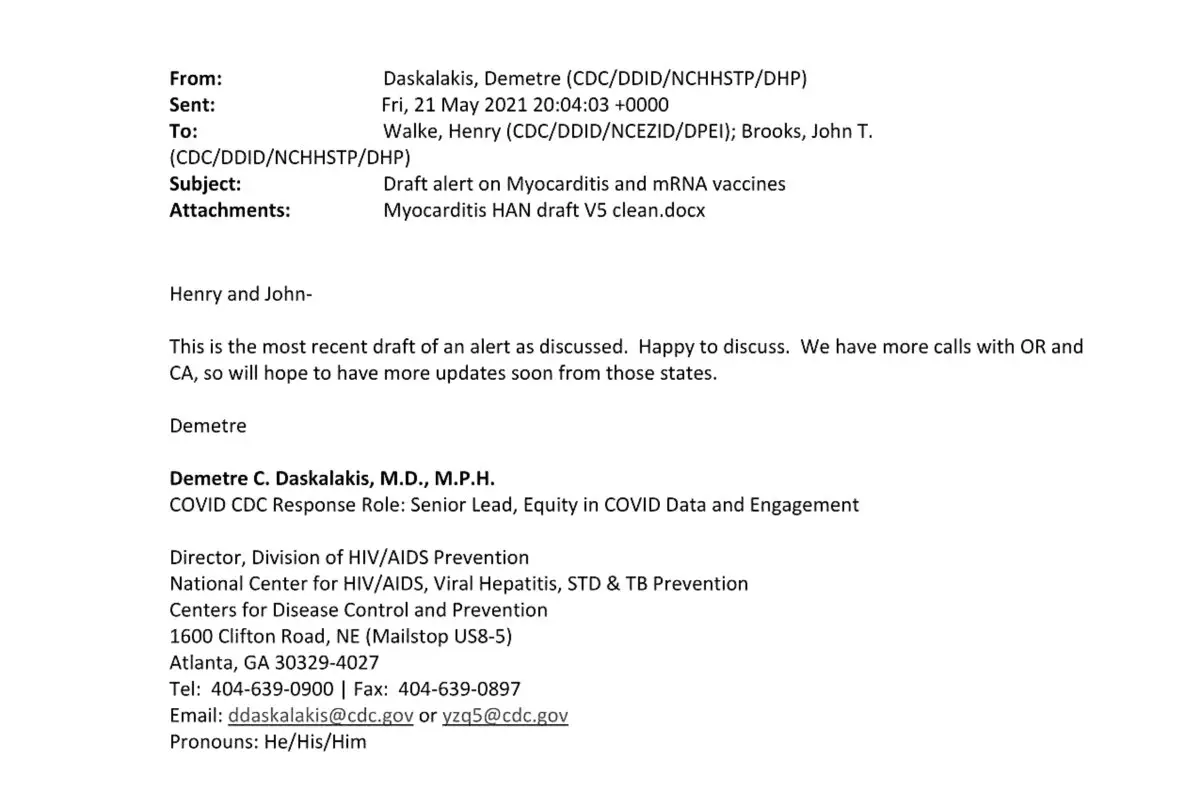CDC Drafted Alert for Myocarditis
and COVID-19 Vaccines, but Never Sent It
CDC later sent alerts encouraging people to get vaccinated.
The U.S. Centers for Disease Control and Prevention (CDC) prepared to alert state and local officials to an emerging connection between heart inflammation and COVID-19 vaccines, but ultimately did not send the alert, according to a new document obtained by The Epoch Times.
The CDC sends alerts to federal, state, and local public health officials and doctors across the nation through a system called the Health Alert Network (HAN). Messaging through the system conveys “vital health information,” according to the CDC.
In May 2021, CDC officials drafted an alert on myocarditis and the two most widely used COVID-19 shots, according to the newly obtained document, which is being made public for the first time by The Epoch Times.
“This is the most recent draft of an alert as discussed. Happy to discuss,” Dr. Demetre Daskalakis, the CDC’s top official for equity in COVID-19 data and engagement, told two other high-ranking CDC colleagues in the email.
It was titled “draft alert on myocarditis and mRNA vaccines.”
The Pfizer-BioNTech and Moderna vaccines are made with modified messenger RNA (mRNA) technology.
The draft alert was attached to the email. The Epoch Times is working to acquire the draft alert.
“This censorship of a proposed alert in May of 2021 is just one more example of our regulatory agencies’ repeated pattern of behavior to censor any information that serves to counter the narrative that the COVID-19 vaccinations are ’safe and effective,’” Dr. Joel Wallskog, co-chair of the vaccine-injured advocacy group React19, told The Epoch Times via email.
The CDC started receiving reports of post-vaccination myocarditis in January 2021 and either failed to detect or ignored a safety signal for myocarditis and the mRNA shots the following month, previous reporting from the Epoch Times showed. The agency also hid a warning from Israel, the country that first vaccinated young people, who face the highest risk of myocarditis from COVID-19 vaccination.
 By Zachary Stieber 1/17/2024
By Zachary Stieber 1/17/2024
Updated: 1/18/2024
The CDC’s media office declined to outline how the CDC made sure the same people who would have received a HAN saw the clinical consideration document.
“The clinical consideration reached the provider audience as the HAN would have,” a spokesperson alleged. “A clinical consideration is useful when information needs to be updated as circumstances evolve, and more data is collected and evaluated.”
Double Standard?
The Health Alert Network has been sending messages since at least 2001, according to an archive of the alerts. The CDC says the network is the agency’s “primary method of sharing cleared information about urgent public health incidents with public information officers; federal, state, territorial, and local public health practitioners; clinicians; and public health laboratories.”
The CDC issued an alert on Jan. 8, 2020, for what became known as COVID-19, providing several updates in the subsequent months on the illness. The agency also shared alerts on testing for COVID-19, travel on cruise ships, and a rare disease called MIS-C linked to COVID-19.
The message noted six cases of the combination of conditions, cerebral venous sinus thrombosis with thrombocytopenia (TTS), had occurred in women after receipt of the shot and that one had died. Authorities advised doctors and officials to stop administering the vaccine while a safety review was conducted.
One month later, the CDC officials considered the alert for COVID-19 vaccines and myocarditis. By that time, hundreds of cases had been reported in Israel, the United States, and other countries, including two deaths in Israel and other deaths in the United States.
Dr. Hoeg said CDC officials involved in the draft should testify.
“I think it’s going to be crucial to figure out who decided that the alert shouldn’t be sent after all, after they had already apparently written it,” Dr. Hoeg said. “It would be nice to have one of the people included on the email testify before Congress about how it was determined the alert about post-RNA vaccination myocarditis should not be released.”
The U.S. House of Representatives Select Subcommittee on the Coronavirus Pandemic, which is investigating the U.S. response to the pandemic, declined to comment.

